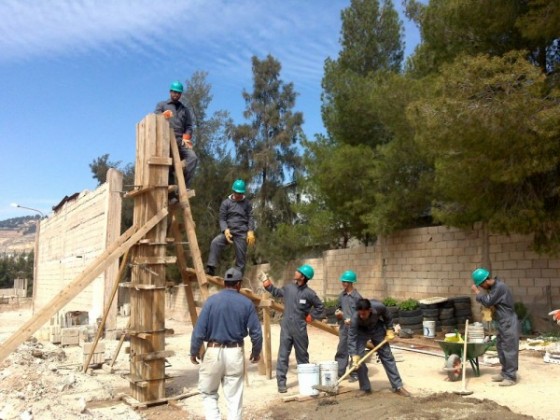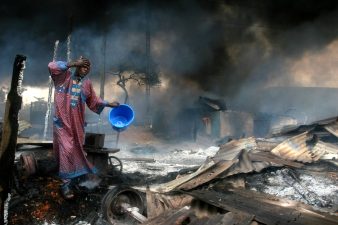 Entity Green brings greener development, recycling, and eco-friendly lifestyles to Amman, Jordan. Above, an EG team constructing a new building.
Entity Green brings greener development, recycling, and eco-friendly lifestyles to Amman, Jordan. Above, an EG team constructing a new building.
After learning about the farmer’s market, Souq al Balad, that Entity Green helped organized in Amman a few months ago, we decided we wanted to know what else this organization was up to. And so we spoke to Anselm Ibing, manager of the organization’s recycling program, to learn more. Here’s what he had to say.
Please tell us a little about Entity Green (EG), and why it was founded.
The basic answer is that is was founded because we were seeking a new approach to development in Jordan. The founders had been working in Jordan for several years and witnessed many failed projects and wasted money. We brought together experts from the non-profit sector and business and attempted to combine the best of both trades. We wanted to use the efficiencies and self-sustainability of business and apply it to development projects in Jordan. Our recycling program is a great example of this.
Who were the founding members of EG, and what were their backgrounds?
Philip Griffith – Spent many years working within the the NGO sector of the Middle East. Is no longer with the company.
Wajih Ireifej – Originally from Jordan but grew up in the United States. Educated as an engineer, however, spent most of his professional career in the IT industry. Arrived in the Middle East approximately 5 years ago to manage an IT project. Within a couple years EG was created and he’s been the GM ever since.
Aaron Bouchane – Worked for in Jordan’s NGO sector before joining EG, has a background in environmental management and international development.
How did you become involved with EG?
Myself, I’m originally from Germany, studied Arabic and International Relations in Scotland and then started working in the Middle East (in SEKEM in Egypt). I’ve lived in Jordan since mid-2007, studying and working in the environmental field and started working with EG in October 2009. I originally managed the whole recycling program and together with my colleagues, helped to grow it from a very small and unsustainable project of working with 1 hotel and 2 embassies, to the large, financially feasible program that it now is, employing 30 people, working with ten 5-star hotels, six embassies, two major supermarkets, Jordan’s largest mall, various factories and dozens of other accounts, currently recycling 7-10 tons of materials per day.
Are your activities centered mainly in Amman, and if so, do you have goals to expand to other areas in Jordan in the future?
Our training program is based in Ein al-Basha, just north-west of Amman and all training currently takes place there.
With regards to recycling, though the bulk of our activity is in and around Amman, we have a branch in Aqaba now, which opened about a month ago, working with hotels and schools down there; we are working with 3 big hotels at this side of the Dead Sea; we have a small project starting in Jerash – greening the famous archeological site there; we also work in the industrial areas east of Amman, such as Sahab and Zarqa.
We are planning to expand our work to Petra very soon and into the industrial areas, not only east of Amman, but also in the various Qualified Industrial Zones around the country (e.g. Mafraq, Irbid) and the new Development Zones (e.g. Maan, King Hussein Bin Talal, Jabal Ajloun etc).
In the composting program, we are hoping to work in the Ma’daba area, as well as throughout the Jordan Valley.
We know that you are devoted to sustainable programs within Jordan, but do you have any more regional projects in mind?
Currently, we are not involved in any activities or projects outside Jordan. However, we are slowly building a network of interested individuals, organizations and companies across the region and hope for opportunities to work beyond Jordan in the near future.
Please tell us about some of the programs you are currently operating.
Recycling in basically two streams:
1) offering recycling as a service to those who’re after green certification (hotels, restaurants, schools etc) and
2) providing complete recycling solutions to large producers of waste
Recycled Design – using waste materials as the basis for designing products that will then be produced by using local labour force from marginalized communities.
Read more about Entity Green:Get Your Organic Produce at Amman’s Souq al Balad Farmer’s Market
Welcome Home: Meet Theo Who’s Running Jordan’s Alternative Eco Aqaba House



